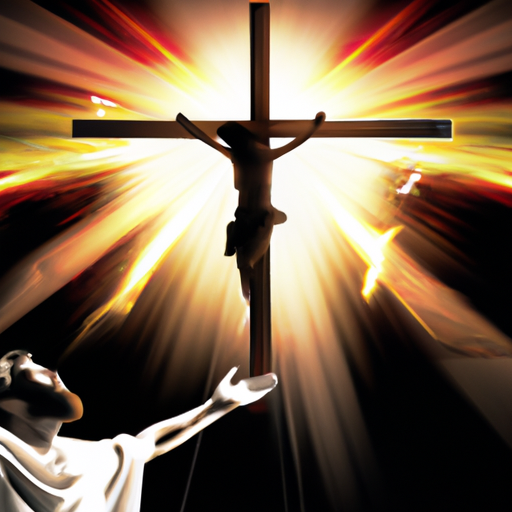In this engaging article, we will explore the profound significance of the Messianic Psalms and how they foretell the suffering and triumph of Christ. Focusing specifically on Psalm 22:1, we will uncover the powerful prophecies hidden within its verses. Prepare to witness the extraordinary connection between the ancient Psalms and the life and mission of Jesus, as we delve into the depths of this remarkable scripture. Get ready to be inspired and amazed by the profound insights awaiting you!
Psalm 22:1: A Cry of Desolation
The Opening Lament
Psalm 22:1 begins with a poignant and heartfelt cry of desolation. This verse, attributed to King David, expresses the deep anguish and sorrow that the speaker is experiencing. It serves as a powerful opening to a psalm that delves into themes of suffering, abandonment, and ultimately, triumph.
David’s Expression of Abandonment
In Psalm 22:1, David vividly expresses his feelings of abandonment. He cries out, “My God, my God, why have you forsaken me?” These words capture the intensity of his emotions at the time and demonstrate his desperate need for God’s presence and deliverance. David, in his distress, feels as if God has turned His back on him, leaving him to face his troubles alone.
The Prophetic Fulfillment
Though initially spoken by David, Psalm 22:1 takes on a profound prophetic meaning when seen in the context of Jesus Christ. Through the eyes of Jesus, we can understand the full extent of the desolation and abandonment depicted in this verse. Jesus, on the cross, cried out these very words, experiencing the complete forsakenness that David had only hinted at. In this way, Psalm 22:1 finds its ultimate fulfillment in the suffering and sacrifice of Jesus.
Messianic Psalms and Their Significance
Defining Messianic Psalms
Messianic Psalms are a collection of psalms in the Hebrew Bible that contain prophetic references to the coming Messiah, a figure of great importance and significance in Jewish and Christian theology. These psalms often present a unique blend of personal lamentations and powerful prophecies, offering insights into the nature, purpose, and mission of the awaited Messiah.
The Importance of Psalms in Jewish Tradition
Psalms hold a central place in Jewish tradition and worship. They are revered as both expressions of deep emotion and profound theological truths. The Messianic Psalms, in particular, carry immense significance for Jews, as they provide insights into the nature of the Messiah and the hope for redemption and restoration. These psalms serve as a source of comfort, inspiration, and anticipation for the coming of the Messiah.

The Messianic Psalm 22 in Context
The Structure of Psalm 22
Psalm 22 is a remarkable composition, both in its structure and content. It is divided into three distinct sections: an opening lament (verses 1-21), a plea for deliverance (verses 22-31), and a concluding declaration of God’s faithfulness (verses 27-31). This carefully crafted structure enhances the impact of the psalm and contributes to its overall message of hope and restoration.
Comparing with Other Messianic Psalms
When comparing Psalm 22 with other Messianic Psalms, such as Psalm 2, 45, and 110, certain common themes and motifs emerge. These psalms collectively paint a picture of the Messiah as a suffering servant, a righteous king, and a victorious conqueror. Psalm 22, in particular, stands out for its vivid depiction of the Messiah’s sufferings, which find their ultimate fulfillment in the life, death, and resurrection of Jesus Christ.
Christological Interpretation of Psalm 22
Jesus’ Reference to Psalm 22
One of the most significant aspects of Psalm 22 is its connection to Jesus Christ. In Matthew 27:46, as Jesus hangs on the cross, He quotes the opening words of Psalm 22:1, “My God, my God, why have you forsaken me?” This direct reference to the psalm underscores its importance in relation to the suffering and redemptive work of Christ.
The Suffering of Christ Foretold
Psalm 22 serves as a remarkable prophecy of the sufferings that Jesus would endure. The vivid descriptions of physical agony, mental anguish, and the mockery inflicted upon the speaker find a striking parallel in the sufferings of Jesus during His crucifixion. The psalm provides a prophetic glimpse into the immense price that Christ would pay for the salvation of humanity.
The Triumph of Christ Foretold
While Psalm 22 begins with a cry of desolation, it ultimately culminates in a triumphant declaration of God’s faithfulness and deliverance. This parallel with the life of Christ is evident as well. Despite enduring unfathomable suffering, Jesus conquered death and triumphed over sin, fulfilling the Messianic hope and establishing a path of salvation for all who believe in Him.

Key Elements in Psalm 22:1
The Introductory Cry
Psalm 22:1 opens with a powerful cry, “My God, my God, why have you forsaken me?” This raw expression of anguish sets the tone for the entire psalm and serves as a reverberating refrain throughout Jesus’ crucifixion narrative. It captures the depths of despair and abandonment that the speaker, and ultimately Christ Himself, feel in their darkest moments.
The Sense of Forsakenness
The psalmist’s cry of forsakenness reflects a profound sense of abandonment and separation from God. It conveys a deep longing for divine presence and intervention in the face of overwhelming suffering and opposition. This feeling of forsakenness finds its ultimate fulfillment in the forsakenness that Jesus experienced on the cross as He willingly took upon Himself the sins of humanity.
The Communion with God
Despite the overwhelming sense of abandonment, Psalm 22:1 also highlights the speaker’s continued communion with God. The fact that the cry is directed to “My God” demonstrates an underlying belief in God’s faithfulness and the hope of His eventual deliverance. This communion with God, even in the midst of pain and despair, serves as a powerful reminder of the enduring relationship between the speaker and the divine.
David’s Opening Lament
David’s Personal Experience
As the attributed author of Psalm 22, King David provides a personal perspective on suffering and abandonment. Throughout his life, David faced numerous challenges, including persecution, betrayal, and loss. These experiences undoubtedly informed his understanding of the difficult emotions expressed in this lament, making the psalm deeply relatable to those who have encountered feelings of forsakenness.
A Foreshadowing of Jesus’ Experience
While King David may have penned Psalm 22 from his own personal experiences, his words take on a prophetic significance when viewed through the lens of Jesus Christ. David’s cries of anguish and abandonment foreshadow the even greater suffering and forsakenness that Jesus would endure on the cross. In this way, David’s lament becomes a poignant foretelling of the ultimate sacrifice and redemption brought about by Christ.
David’s Expression of Abandonment
Feeling Forsaken by God
In Psalm 22:1, David vividly expresses his feeling of being forsaken by God. He utters the cry, “My God, my God, why have you forsaken me?” These powerful words resonate with the sense of isolation and abandonment that he experienced during trying times. David’s raw emotions give voice to the deep struggles and doubts faced by believers when they feel distant from God’s presence.
Symbolic Language of Darkness
In addition to the sense of forsakenness, David employs symbolic language in Psalm 22 to paint a picture of his suffering. He describes being surrounded by “the horns of the wild oxen” and “lions” that tear at him with their jaws. These vivid images evoke a feeling of helplessness and danger, further emphasizing the intensity of David’s distress and his desperate need for divine intervention.
The Perception of Mockery and Ridicule
David’s expression of abandonment in Psalm 22 goes beyond mere physical suffering. He also laments the mocking and ridicule he faces from his enemies. He describes them as “dogs” and “evildoers” who encircle him and taunt him. This depiction captures the emotional anguish of being derided and humiliated, adding another layer of pain to David’s overwhelming sense of forsakenness.
The Prophetic Fulfillment
Jesus’ Crucifixion and Psalm 22:1
The connection between Psalm 22:1 and Jesus’ crucifixion cannot be overlooked. As He hangs on the cross, Jesus cries out the very words spoken by David centuries before: “My God, my God, why have you forsaken me?” This direct reference highlights the fulfillment of prophecy and underscores the depth of Jesus’ identification with both David’s lament and the suffering of all humanity.
The Centrality of Psalm 22 in the Crucifixion Narrative
Psalm 22 holds a central place in the narrative of Jesus’ crucifixion. Throughout the Gospel accounts, details and allusions from this psalm are interwoven in the events surrounding His death. The casting of lots for Jesus’ garments, the scoffing and mocking of the crowd, and even Jesus’ final words find parallels in the vivid descriptions of suffering and abandonment found in Psalm 22. This convergence further highlights the prophetic significance and relevance of this psalm to the life and mission of Jesus.
Defining Messianic Psalms
Psalms as Prophetic Literature
Messianic Psalms are a subset of the larger tradition of prophetic literature found in the Psalms. While many of the psalms are expressed as the personal prayers and laments of the authors, they also contain prophetic elements that foreshadow the coming of the Messiah. These prophetic elements serve to deepen our understanding of the Messianic hope and provide glimpses into the redemptive work of Christ.
Identifying Messianic Psalms
Identifying Messianic Psalms can be a complex task, as it requires careful interpretation and discernment. Certain psalms, such as Psalm 2, 16, 22, 45, 72, 89, and 110, are commonly recognized as having Messianic significance. These psalms contain explicit references to the Messiah, His mission, and His kingdom, which align with the characteristics and work attributed to Jesus in the New Testament. By examining these psalms, we gain a deeper appreciation for the intricate tapestry of prophecy and fulfillment woven throughout Scripture.
Hope and Restoration in God’s Presence
The Path towards Renewal and Healing
While Psalm 22 begins with a cry of desolation, it ultimately unfolds into a powerful affirmation of hope and restoration in the presence of God. The speaker, after pouring out his lament, acknowledges the faithfulness and power of God. He expresses confidence in God’s deliverance and proclaims that all the nations will worship and remember Him. This path towards renewal and healing reminds believers that even in their darkest moments, God’s presence and intervention can bring about a profound transformation.
The Anticipation of Divine Intervention
Psalm 22 captures the anticipation of divine intervention that lies at the heart of Jewish and Christian faith. The speaker, in the midst of his suffering and abandonment, clings to the hope that God will ultimately prevail and bring about justice and redemption. This anticipation resonates deeply with believers who long for God’s intervention and the fulfillment of His promises. In the Messianic hope, we find the assurance that God’s purposes will ultimately be realized, and His faithfulness will prevail.
In conclusion, Psalm 22:1 serves as a powerful cry of desolation, expressing feelings of abandonment and forsakenness. While initially spoken by David, this verse takes on a prophetic significance when viewed through the lens of Jesus Christ. The Messianic Psalms, including Psalm 22, offer profound insights into the suffering and triumph of Christ, providing a path towards hope, restoration, and anticipation of divine intervention. Through the depths of despair, these psalms invite believers to draw near to God and find solace in His presence.







